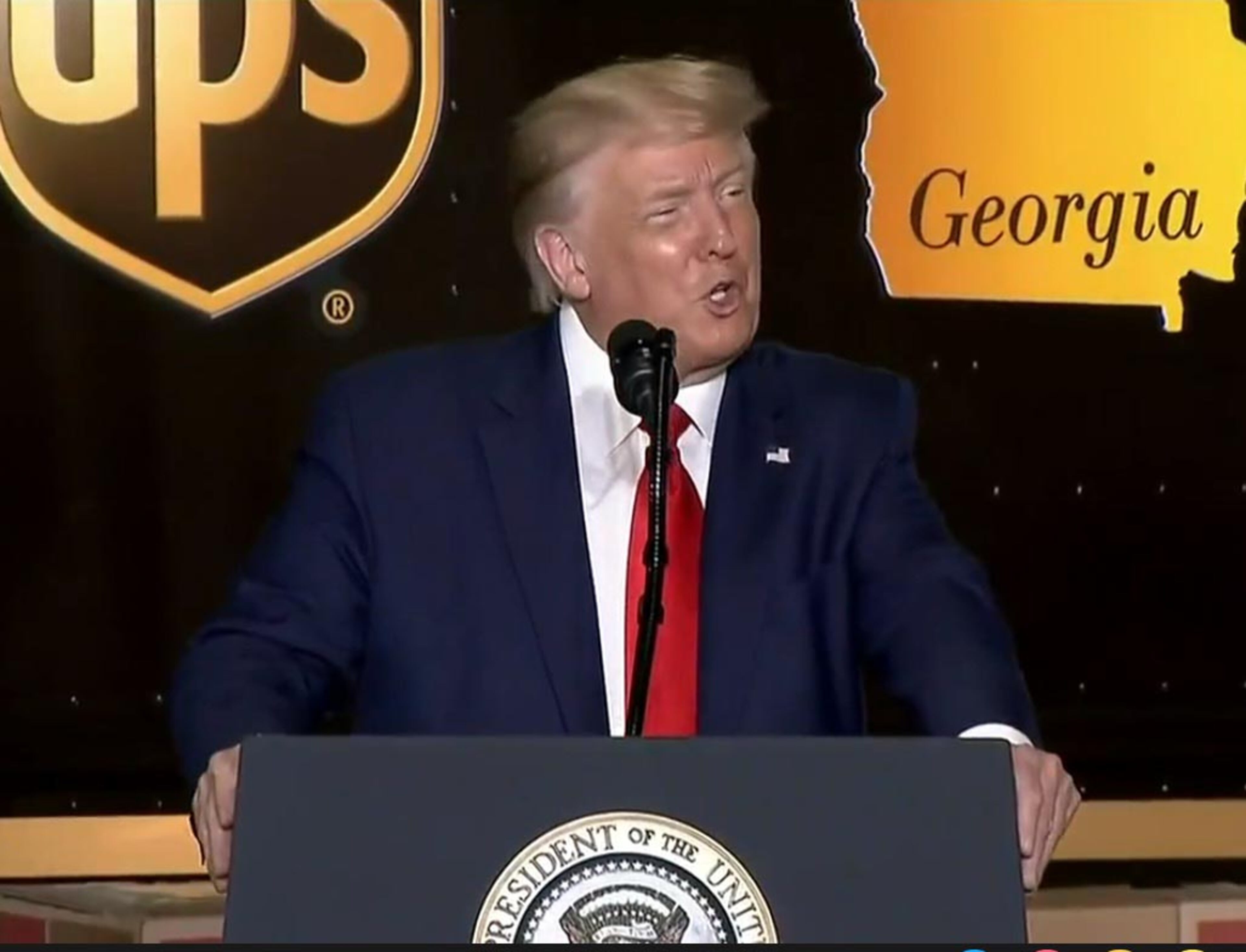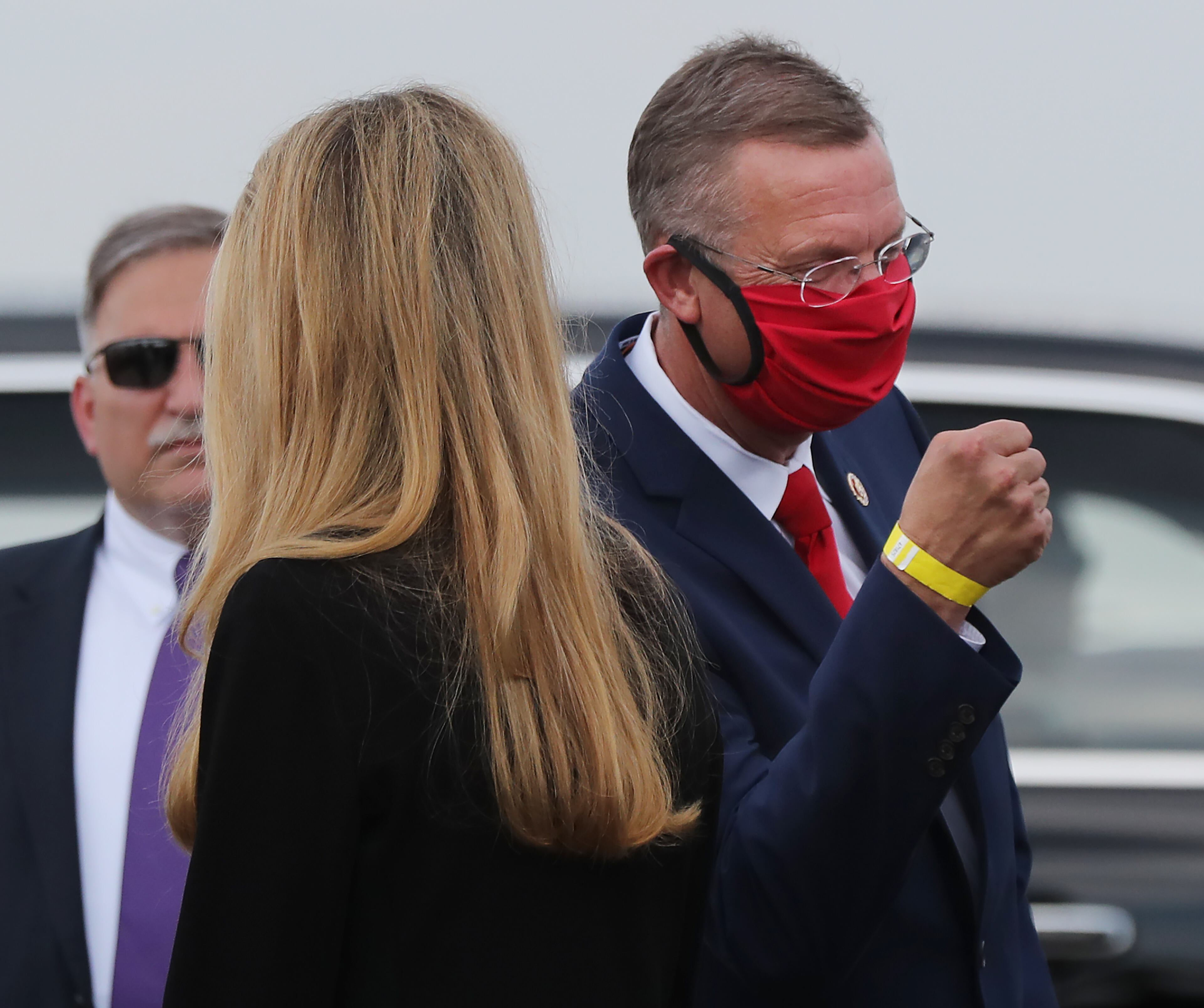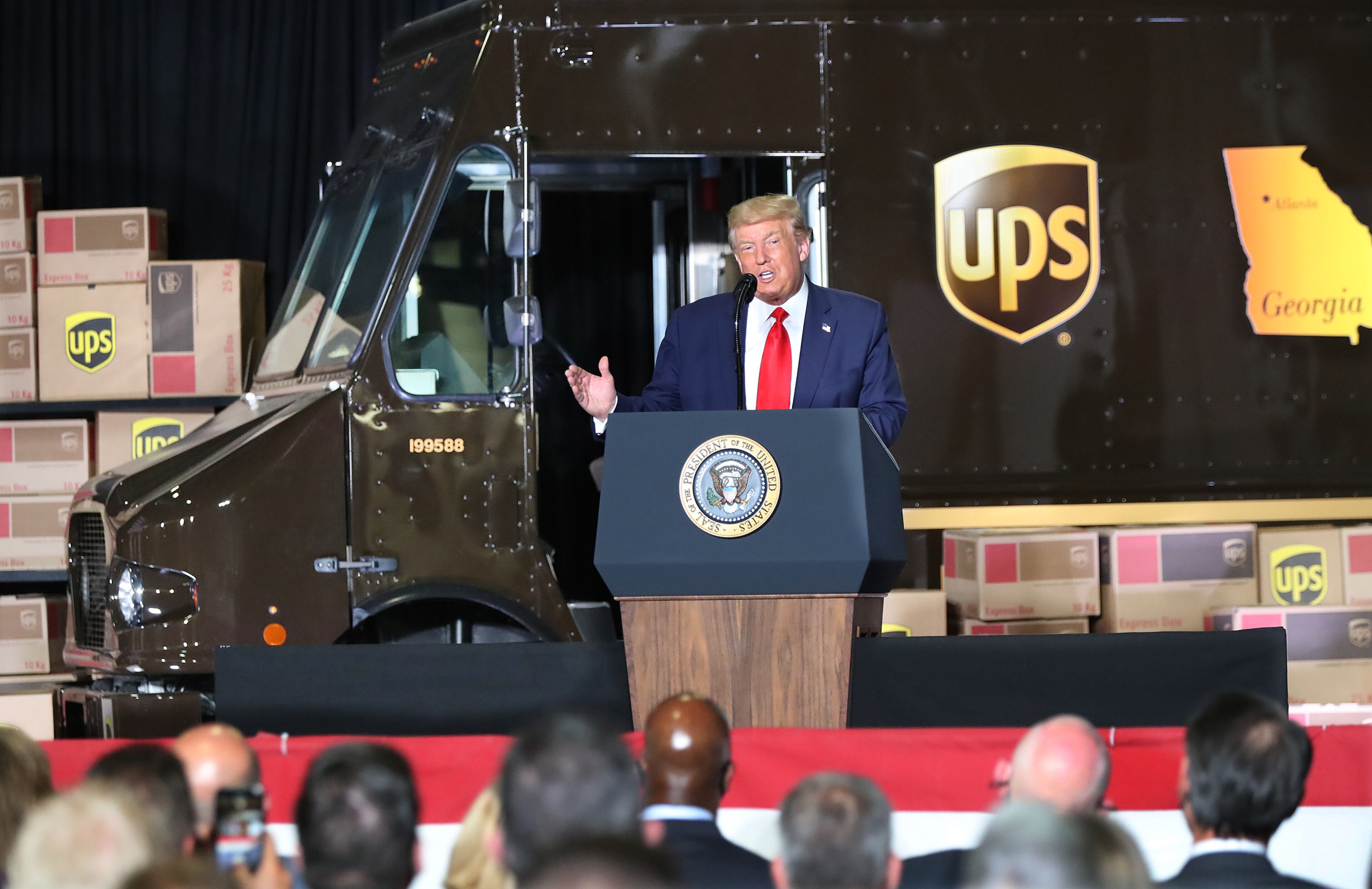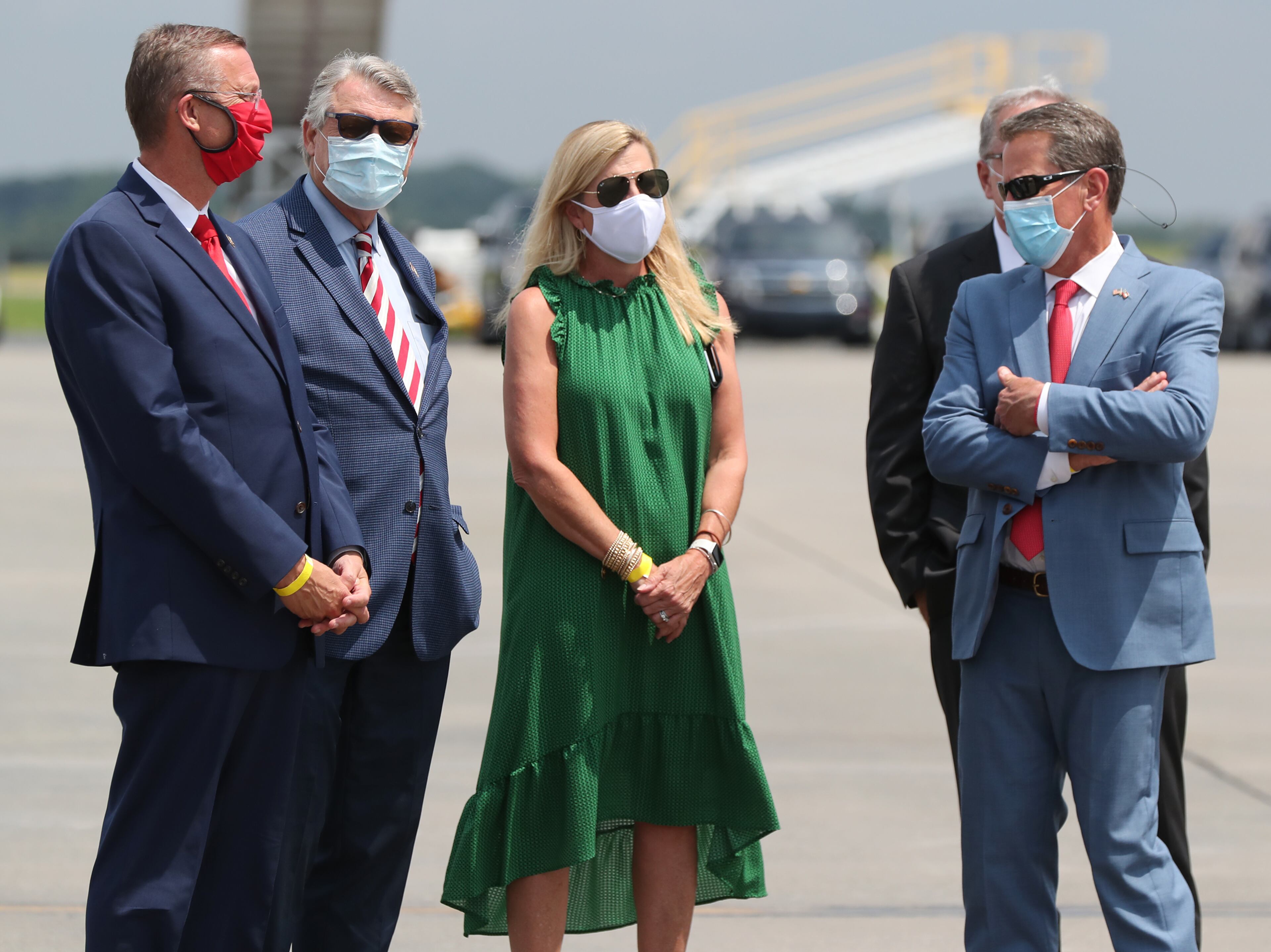Trump touts plan to speed infrastructure projects in Atlanta















President Donald Trump used a brief trip to Atlanta on Wednesday to tout changes to the federal environmental review process, an overhaul he said would speed the permitting of infrastructure projects, including a long-planned lane expansion on I-75.
In a 41-minute address at UPS’ airport hub at Hartsfield-Jackson International Airport, Trump said his administration’s move would have a major effect on the construction of new highways, pipelines and power plants. Developers often wait years for approval as they navigate the byzantine regulatory process, he said.
“For decades, the single biggest obstacle to building a modern transportation system has been the mountains and mountains of bureaucratic red tape in Washington, D.C.,” Trump told a crowd of more than 100 UPS employees, executives and Republican elected officials. “All of that ends today.”
Meanwhile, Democrats and critics warned that the Trump administration was undoing one of the country’s most effective environmental laws, one that’s provided a critical safeguard for low-income and minority communities that are disproportionately located near heavy-polluting industrial operations.
The White House’s moves centered on the National Environmental Policy Act, a Nixon-era law that requires federal agencies to study the environmental impact and take public comments on proposed infrastructure projects before permits are issued.
The law’s critics, including chemical firms and energy companies, say the process is often too burdensome and that opponents can hold up projects for years in court, driving up the costs or blocking them entirely.
Recently, lawsuits slowed the Keystone XL and Dakota Access pipelines, two projects the president supported.
New rules
Trump’s changes would shorten the bulk of the environmental review process to less than two years and restrict how federal agencies can take climate change into account when approving new projects.
“Together we’re reclaiming America’s proud heritage as a nation of builders and a nation that can get things done,” said Trump, a developer.
Ahead of his visit, the president’s critics framed him as blind to the racial disparities of the nation, particularly on environmental issues.
Major infrastructure projects are often proposed for neighborhoods where property values are low, said Neill Herring, a lobbyist for the Georgia Sierra Club.
“This is a federal law that protects everybody’s neighborhood as if it were Buckhead,” Herring said. “Removing that protection is criminal, particularly given the current dialogue on race in this country.”
State Sen. Nikema Williams, the head of the Democratic Party of Georgia, slammed Trump for visiting Atlanta to trumpet a campaign promise rather than check in with people suffering from COVID-19.
“We know that this is just another attempt to cover his broken promises as our roads continue to crumble and the country braces for the heavy economic impact of COVID-19,” Williams told reporters.
Political maneuvering
Trump’s first Atlanta appearance since March set off political maneuvering from Republicans eager for a share of his attention — and an awkward scene on the tarmac between rival Georgia GOP factions backing U.S. Rep. Doug Collins and U.S. Sen. Kelly Loeffler.
Gov. Brian Kemp shared what appeared to be polite but not overly friendly words with Collins, who is running for the U.S. Senate against Loeffler, the governor’s hand-picked selection for the seat.
When Trump emerged from Air Force One, he shared warm greetings with Kemp and Collins, who stood near the president’s waiting vehicle. Collins’ interaction with Loeffler, who followed the president off the plane after flying in with him from Washington, was more terse — and quick.
Still, Trump betrayed little about which candidate he supports in the November special election.
He called Loeffler a “good person, a good woman,” adding “she’s been so supportive of me.” As for Collins, Trump framed him as an “incredible spokesman and an incredible man and friend.”
Trump glossed over the rift he opened with Kemp in April, when the president criticized his ally for rolling back coronavirus restrictions in Georgia prematurely.
“You’ve done a great job in every aspect of running this incredible state, and I’ve always been there for you,” Trump told the governor, before teasing him for calling too much.
The president’s visit came as recent polls showed him neck-and-neck with Democratic rival Joe Biden in Georgia. Earlier Wednesday, Biden criticized the Republican’s “complete and utter failure” to lead the country and combat the spread of the coronavirus.
“This administration’s mismanagement has left working families and small business owners out in the cold as they endure the worst economic losses the country has faced in modern memory,” Biden said in a statement.
Local impact
Earlier in the day, the White House highlighted the effect changes to the National Environmental Policy Act would have on a major infrastructure project pending in Georgia: the $2 billion expansion of I-75. A 2017 state audit questioned whether the project, which would add truck lanes along the busy corridor between McDonough and Macon, was needed in the first place, but proponents say it would speed traffic to and from the Port of Savannah.
Environmentalists view the related project to deepen the harbor in Savannah from 42 to 47 feet as an example of the success of the current environmental process.
The dredging work would have threatened nearby wetlands, harmed local drinking water and imperiled local sturgeon, according to the Natural Resources Defense Council. But a deal was eventually struck to secure water quality monitoring and preserve wetlands.
Former Republican U.S. Rep. Jack Kingston, whose Savannah-based House district included the port, saw things differently. He said environmental groups “used and abused” the process to drag out the project’s timeline based on details and technicalities.
“It just took forever,” said Kingston, a Trump surrogate who since leaving Congress has lobbied on behalf of the Georgia Ports Authority. “Every time we came up with something that everybody had previously agreed on, they would change their mind and want something else.”
Trump blasted those delays in his speech before boasting about his administration’s approval of new funding for dredging.







